Tokyo Paralympics 2020: Latest news from Japan ahead of games
Australia’s Paralympians have set their sights on another big medal haul in Tokyo after selecting a record sized team for the Games
Olympics
Don't miss out on the headlines from Olympics. Followed categories will be added to My News.
AUSTRALIA’S Paralympians have set their sights on another big medal haul in Tokyo after selecting a record sized team for the Games, which run from August 24-September 5.
Paralympics Australia has picked a team of 179 athletes for Tokyo, the biggest for any Paralympic Games apart from Sydney 2000, competing in 18 sports and with a stack of gold medal chances.
Team officials won’t speculate about how many medals the team will collect to avoid putting any undue pressure on competitors but expectations are sky high for a team that has always performed well in the green and gold.
“After finishing on top of the medal tally at Sydney 2000, we finished fifth in the world at each of the past four Games,” Paralympics Australia chief executive Lynne Anderson said.
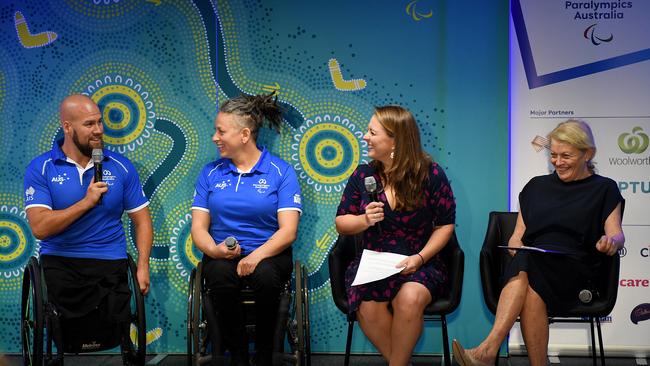
“It’s a record of excellence that has impacted Australian society in a profoundly positive way and helped change the narrative around disability.
“I know this team will be fiercely determined to continue that progress.”
Athletics, swimming and cycling have always provided the bulk of Australia’s gold medals in the past and are again expected to be highly profitable in Japan but Australia also has strong chances in wheelchair basketball, wheelchair tennis, wheelchair rugby, para-canoe, table tennis, archery, rowing and triathlon.
Just over half the team have competed at previous Paralympic Games with Christie Dawes (athletics) and Daniela Di Toro (table tennis) each returning for an astonishing seventh time and Angela Ballard (athletics) — back for a sixth time.
The youngest team member is swimmer Isabella Vincent, who will be 15 years and 222 days when the Games open on August 24. The oldest athlete is archer Peter Marchant, who will be 60 years and 74 days.

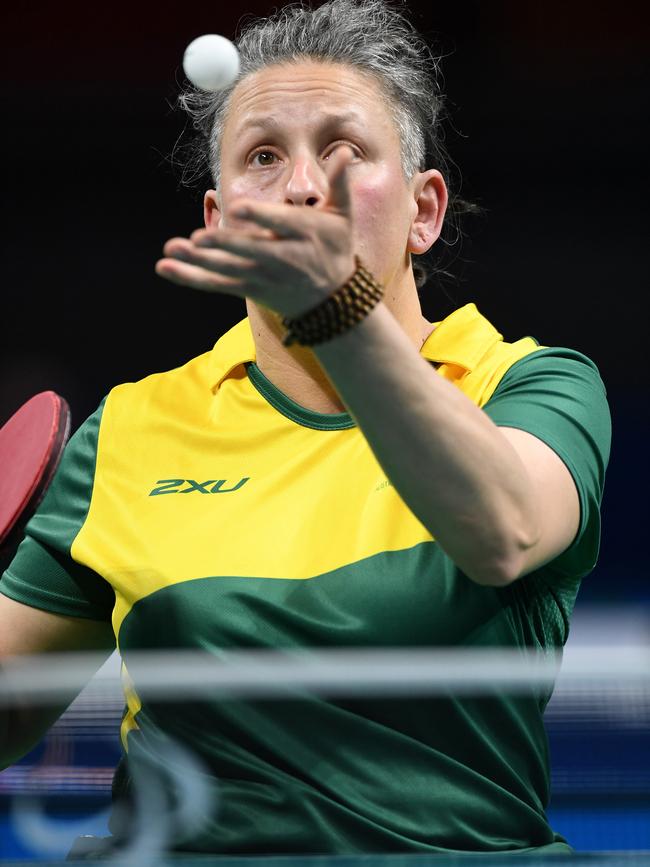
Just making it to the Games has been a logistical minefield for athletes and officials after the 12-month delay and the ongoing problems with the pandemic and Australia’s Paralympians warned the health risks they face could far exceed the dangers the Olympic team experienced.
Some athletes face increased threats of serious illness from the coronavirus because of existing medical conditions while medical experts fear the risk of infection at the Paralympics could be much higher than at the Olympics.
“To qualify for an Australian Paralympic Team is an outstanding achievement. Yet, this time, it has required a unique level of resilience and determination,” the Australian team Chef de Mission Kate McLoughlin said.
“It’s been a long and difficult road but their time has finally arrived. I can’t wait to do everything possible to create the optimal performance environment for our Team members so they can have a safe and memorable experience in Tokyo.”
DEFENDING CHAMPION’S TOUGH NEW PARALYMPIC CHALLENGE
By Erin Smith
She is blind, has a new guide and will be competing in sweltering conditions but paratriathlete Katie Kelly isn’t letting anything stop her defending her Paralympic Gold medal.
Paratriathlon was only introduced as a Paralympic sport in 2016 and Kelly was the first to claim Gold in the PT5 event.
An amazing feat considering the 46-year-old only took up the sport in 2015, after she was declared legally blind.
Kelly, who lives at the Gold Coast, has Usher Syndrome.
Kayo is your ticket to the best local and international sport streaming Live & On-Demand. New to Kayo? Try 14-days free now >

A genetic condition that causes loss of vision and hearing.
Before she lost her vision Kelly was a triathlete, long distance runner and Ironman competitor.
She made her international debut just weeks after being declared legally blind — finishing first in the PT5 event, with Olympic silver medal winner Michellie Jones as her guide.
Their winning form continued at Rio with the duo crossing the line first, more than a minute ahead of the next competitor.
But Kelly knows it will not be easy to win back-to-back Paralympic gold medals.
She has been training at the Gold Coast with new guide Briarna Silk and coach Dan Atkins.
“We all have or own goals as individuals and as a team,” Kelly said.
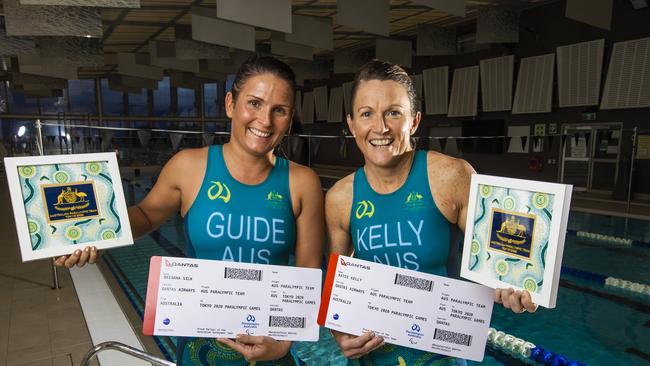
“As a team we know what we are capable of and it is really about fulfilling our potential.”
It is Silk’s first time as a guide and she is excited but nervous.
The 37-year-old has competed at the open level in triathlons for many years before joining Kelly and Atkins.
“Triathlon Australia put an email out to all the local clubs in Queensland saying they were looking for a guide for Katie and my coach at the time suggested it to me,” Silk said.
“I was looking for a new challenge so I put my name down to try out and it went from there.”
Teamwork is a vital part of PT5 events — Silk will use her voice and cues to guide Kelly around the course while tied together at the waist.
In the swim leg they have to swim in unison, with Kelly staying off Silk’s hip.
“Swimming is the hardest to get used to,” Silk said.
“If someone wants to veer off you have to go with them, we swim quite similar but it was a challenge to get used to swimming without bumping into each other.”
Kelly said she had full faith in Silk’s ability to guide her around the course.
“I couldn’t do this without Bri, she has put a lot of time and committment into it. It is very much a team event,” Kelly said.
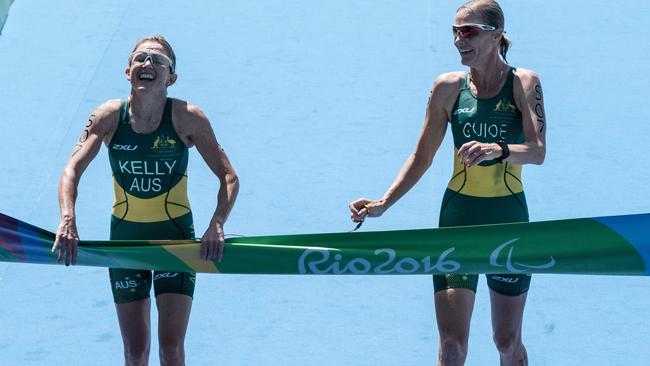
Conditions in Tokyo will be very different to Rio with the water temperature expected to be 32 degrees, the temperature on the course about 35 degrees and humidity high.
To prepare the duo made use of the flume pool at the Queensland Sports and Athletics Centre.
It is like a treadmill but for swimmers. Atkins can adjust the temperature of the water and create a current that determines how fast the athletes have to swim.
“It is going to be hot and humid but Briarna and I love the heat so we are looking forward to it,” Kelly said
“Living in Queensland you embrace it and it is going to be one of our advantages.”
The duo fly to Tokyo on August 20 with their race taking place on August 28.
‘Significant’ challenges await Paralympians in Tokyo
— Ellen Whinnett
Australia’s Paralympians have put in a gold medal performance just to get to the games this year.
Covid-19 border restrictions have robbed the athletes of the chance to acclimatise to the brutal heat and humidity in Tokyo by restricting their arrival into Japan to five days before their events.
Local lockdowns also stopped many of them travelling to northern Queensland to acclimatise, and prevented some national teams from getting together to train.
And the virus itself poses an enormous risk to athletes who have compromised lungs and immune systems.
On July 1 ahead of the Olympics, Tokyo recorded 673 new Covid cases. On Thursday this week, after the Olympics, the city recorded 4989 cases.
The Paralympians will be heading to a city in which hospitals are reaching capacity point, 61 per cent of hospital beds set aside for Covid patients are taken, and the lambda variant has been detected, compounding the problems caused by the highly-contagious delta variant which is sweeping Tokyo.
Despite these hurdles, 174 Paralympic athletes will don the Aussie green and gold this year, along with eight guides and ramp assistants.
Chief medical officer of the Paralympic team, Pip Inge, said Covid had added an “extra layer of complexity’’ to be dealt with by athletes, and the 168 officials who will accompany them.
“The challenges are significant,’’ she said.
“We have athletes who have a range of medical conditions.’’
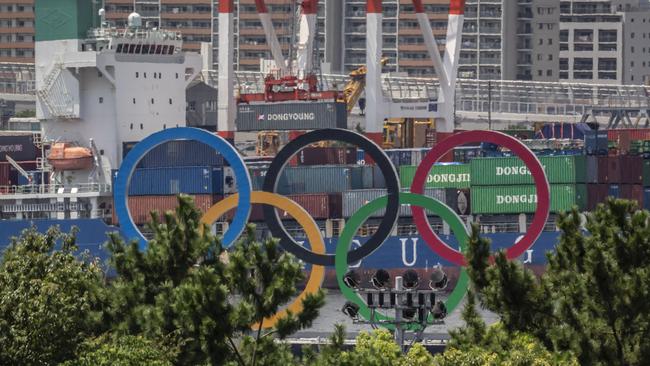
The intense heat and humidity in Tokyo has proved difficult for able-bodied athletes to contend with, and the Paralympians are arriving later this month, when conditions will be even more oppressive.
Dr Inge said some Paralympian athletes were not able to thermoregulate their body temperature, meaning they found it very difficult to manage the heat, particularly those with spinal injuries.
Border rules have banned all Olympics and the Paralympics athletes from arriving into Japan more than five days before their events.
Dr Inge said Tokyo2020 was on track to be the hottest Olympics and Paralympics ever.
“It’s on the radar for a lot of sports. It’s a particular challenge for the athletes from the southern states,’’ she said.
“Heat management is a challenge for us at the best of time.’’
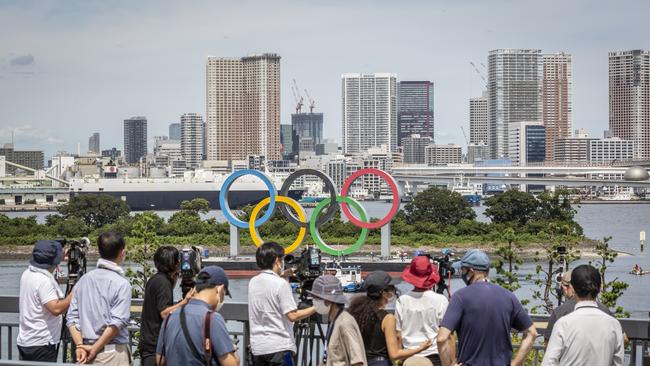
Some athletes were going from a “Melbourne winter to a Tokyo summer. It’s a significant difference.’’
The team had abandoned their plans to hold a pre-staging camp in the Japanese city of Kobe to acclimatise, and had instead planned to get used to hot and humid conditions by training together in far north Queensland.
However, border restrictions had prevented most athletes from Victoria and New South Wales from travelling to join their teammates.
Ryley Batt, the captain of the wheelchair rugby team and co-captain of the Australian Paralympic team, said he was confident the processes put in place would keep the athletes safe.
“The majority of our team struggle to control their body temperature,’’ he said.
“But we’ve done it before. Rio was very hot, and we’ve played in other places in the world where it was hot.’’
Batt said the team would use ice vests, icy-poles, slushies, fans, ice baths and cold towels to help them manage the heat.
Based in Port Macquarie, Batt has been unable to train with his teammates in Melbourne, and will fly down to Melbourne for a single night before the team departs on a charter flight to Tokyo on August 18.
He said Covid was “definitely a risk factor’’ but the team had held extensive meetings with officials and were confident every effort had been made to keep them safe.
“No-one is forcing us to go. We want to go and compete. We’ve been training for five years,’’ he said.
The wheelchair rugby team, known as the Steelers, won gold in Rio and London and silver in Beijing. Tokyo will be Batt’s fifth Olympics.
Dr Inge said ideally, athletes would have had two weeks to acclimatise, or even 10 days. Instead, they will have a maximum of five days.
The second serious concern for the athletes is the risk of contracting Covid. Some Paralympians are extremely vulnerable, and while every member of the team is vaccinated, face a potentially life-threatening risk if they become infected.
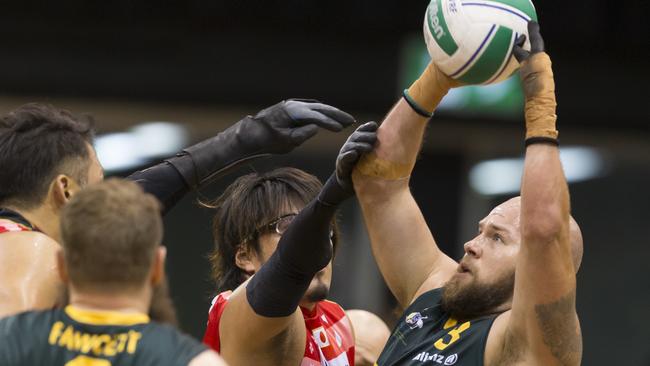
“We have certain athletes that don’t have the ability to clear their lungs,’’ Dr Inge said.
“Others are immune-compromised.’’
Team officials had decided the Paralympians won’t use the communal dining hall at the Olympic village, to mitigate the Covid risk.
But unlike able-bodied athletes, many will not be able to avoid enclosed spaces, as they will be required to use lifts as they are not able to take the stairs.
“These are day to day things to be managed,’’ Dr Inge said.
Three-time Olympian Tyan Taylor, 31, a winger with the goalball team, is relocating from her home in Sydney to Newcastle due to the lockdown.
She said she needed to move to ensure she was able to travel to Melbourne for a staging camp, before heading to Tokyo on August 18.
A vision-impaired athlete, Taylor doesn’t experience the same difficulties as other members of the Paralympic team with regulating her body temperature, but said she was expecting it to be hot and humid.
“I’m aware of the Covid risks,’’ she said.
But she was comfortable that Paralympics Australia had put the team “in safe hands.’’
Getting the athletes home to Australia after the Games is also proving problematic, as they are required to quarantine for 14 days and many need special rooms that can accommodate their wheelchairs and other mobility aids.
Some also need extra levels of care, but caps on numbers mean some athletes are sharing carers.
The Paralympic committee is requesting home quarantine be considered for some of the athletes instead of requiring them to do 14 days in a hotel.
The Paralympic Games run from August 24 to September 5.
More Coverage
Originally published as Tokyo Paralympics 2020: Latest news from Japan ahead of games





